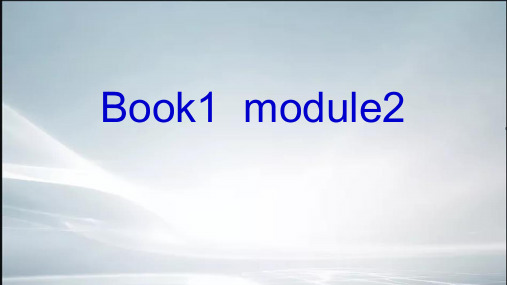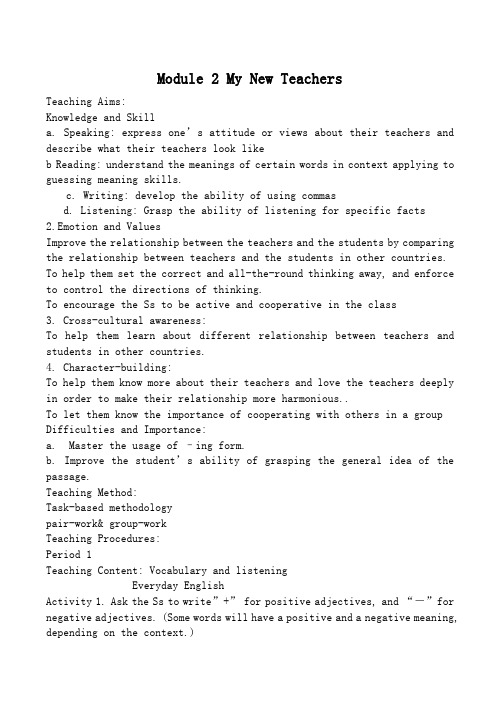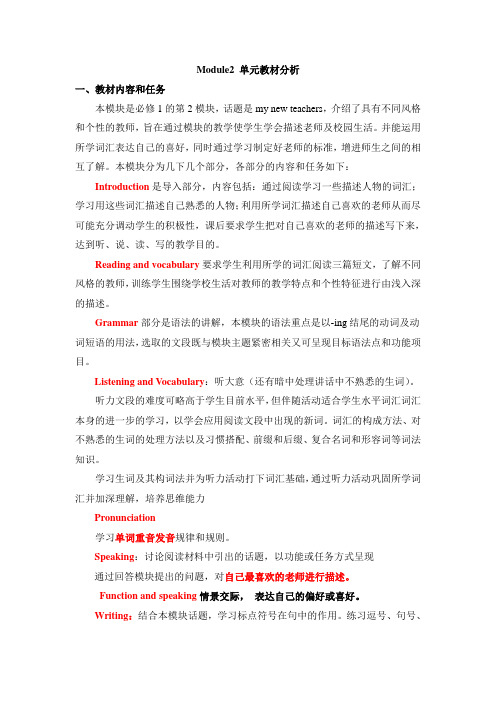英语:必修1-module2-my-new-teachers-grammar课件(外研版)
外研版高中英语必修一Module 2My New TeachersGrammar教案11

Module 2 my new teachersPeriod 2: Grammar and usageStep1: General introduction1.Nouns used as verbs (名词转化动词)Warming upWarming up by reading and translating the following sentences taken from the text:When Zhou Kai’s mother saw him heading towards the front door without a jacket on, she eyed him anxiously.Warming up by understand the following sentences:1) Stop mothering me! I am not a child.2) She fingered the silk gently.3) You ought to diet and take more exercise.Summary about the Nouns used as verbs1. to be, become or to act as the person, animal, or the object denote by the noun1) nouns of persons:She mothered the orphan (act in the manner of a mother)他慈母般地照顾这个孤儿。
2) nouns of animals:Mark parroted what the boss had said(to repeat by rote)鹅鹉学舌般地重复。
He wolfed his meal.(to eat greedily)他狼吞虎叨地吃饭.His cat has kittened. (to give birth)他的猫已下仔儿。
高一英语外研版必修1 Module 2 my new teachers 课件(精品课件)

Mrs Li
old serious strict experienced
Mrs Chen
Mr Wu
young good-looking energetic
I Fast Reading
Read quickly and then match the main idea
2. enthusiastic and energetic
6. be strict with sb. in sth.
3. treat students as friends 7. be well-organized
4. return homework quickly
8. hold/ take a positive attitude towards/ to
me. 4. Which sentence can replace(代替) the one below? We are afraid of speaking if Mrs. Chen doesn’t allow it.
We don’t dare to say a word unless she asks us to.
class.
3s.tuHdeeFntatlskasrleougedtltyinagndbofraesdt,. and waves his hands about a lot when
4. Personally speaking, I respect him a lhoet.gets excited
T
is __k_in_d__ and _p_a_t_ie_n_t_and _e_x_p_la_i_n_s English grammar so clearly that I can _u_n_d__er_s_t_a_n_d__it.
Module2MyNewTeachersGrammar课件-2高中英语外研版必修一

forget doing sth 忘记曾经做过某事 forget to do sth 忘记去做某事
我将不会忘记第一次遇到她时的情景。 I shall never forget meeting her for the first time. 我忘了给她打个电话。 I have forgotten to make a call to her.
1. 父亲决定戒烟。 My father has decided to give up smoking. 2. 我盼望着收到你的来信 I’m looking forward to hearing from you. 3. 他已经习惯于住在大城市. He has got used to living in big cities.
For more exercises, click here.
Homework
1. Revise what you have learned during this period of class. 2. Get ready for the next period of class.
③ begin, start, continue 后跟to do和动词-ing 形式,通常没有差别。但在下列三种情况下, 其后需用动词不定式: A. 当 begin/start 用于进行时时; B. 当 begin/start的主语是物时; C. 当其后的动词为表示心理活动或精神状态 的动词时。如:
4. 误了这班车意味着还得等一个小时。 Missing the bus means waiting for another hour.
高中英语 Module 2 My New Teachers Grammar课件 外研

even though I told him I lived
nearby.(2004 江苏)
A .find
B. to find
√C. on finding
D. in finding
9. Accustomed to the steep mountains, he had no difficulty reaching the top. (2005 上海 )
√B. having time
C. to have time D. to having time
3. There are a few students who keep coming to class late…
4. I think this is because he really enjoys teaching Chinese literature.
} like
hate keep
+V-ing
√D. getting
4. After he became conscious, he remembered ____ and ____ on the head with a rod. (2006江西) A. to attack; hit B. to be attacked; to be hit C. attacking; be hit
Period 2
Verbs followed by -ing 1.But now, after two weeks, the class really likes
working with her.
2. I’ve always hated making mistakes or pronouncing a word incorrectly.
高中英语 Module 2 My New Teachers Grammar课件 外研版必修1

A .find
B. to find
√C. on finding
D. in finding
K12课件
14
9. Accustomed to the steep mountains, he had no difficulty reaching the top. (2005 上海 )
√A. climbing B. climb
A. accept √B. accepting
C. to accept D. accepted
K12课件
11
6. He got well-prepared for the job
interview, for he couldn’t risk the
good opportunity. (2005 上海 )
√D. not having worked
K12课件
6
1. I can’t stand ____ with Jane in the
same office. She just refuses ____
talking while she works. (2006北京)
A. working; stopping
A. to lose C. to be lost
√B. losing
D. being lost
K12课件
12
7. When asked by the police, he said
that he remembered at the party,
but not . (2005全国)
A. to arrive; leaving
K12课件
17
12. I really appreciate to relax with you on this nice island. (2001全国) A. to have had time
外研版高中英语必修1Module2 My New Teachers

Module 2 My New TeachersTeaching Aims:Knowledge and Skilla. Speaking: express one’s attitude or views about their teachers and describe what their teachers look likeb Reading: understand the meanings of certain words in context applying to guessing meaning skills.c. Writing: develop the ability of using commasd. Listening: Grasp the ability of listening for specific facts2.Emotion and ValuesImprove the relationship between the teachers and the students by comparing the relationship between teachers and the students in other countries. To help them set the correct and all-the-round thinking away, and enforce to control the directions of thinking.To encourage the Ss to be active and cooperative in the class3. Cross-cultural awareness:To help them learn about different relationship between teachers and students in other countries.4. Character-building:To help them know more about their teachers and love the teachers deeply in order to make their relationship more harmonious..To let them know the importance of cooperating with others in a group Difficulties and Importance:a. Master the usage of –ing form.b. Improve the student’s ability of grasping the general idea of the passage.Teaching Method:Task-based methodologypair-work& group-workTeaching Procedures:Period 1Teaching Content: Vocabulary and listeningEveryday EnglishActivity 1. Ask the Ss to write”+”for positive adjectives, and “-”for negative adjectives. (Some words will have a positive and a negative meaning, depending on the context.)the words given above.For example: Our science teacher is very energetic and intelligent.I am fond of Mr. Li’s classes. They are never boring.Our English teacher is serious but his teaching style is well organized.______________________________________________________________________________________________________Activity 3 Pair workDiscuss the following sentences True or False according to your own experiences. And share your opinions with your partner.All good teachers talk a lot.I think teachers need to be strict.I like teachers who are amusing and can laugh with their students.The most popular teachers are always very kind.Good teachers make sure that everyone in the class understands.Good teachers always return homework quickly.You should be able to ask your teacher questions at any time during a lesson. It doesn’t matter if a teacher is not organized.Activity 4 Listening.Listen to Alex, and English student, and tick the sentences above that he agrees with. Compare your choices with Alex and have a discussion with your classmates what makes a good teacher.Activity 5 Everyday EnglishMake sure the students know the meaning of the following expressions. Have you got that take a look kids that’s settled a couple of things it’s up to youComplete the conversations with these expressions.Activity 5 HomeworkMemorize the adjectives we have learned in the class.You should know some adjectives have positive or negative meanings or both. Period 2Teaching Content: Reading and VocabularyActivity 1. Warming-up( brainstorming)Try to find out the positive adjectives to describe the three teachers in the textbook.Activity 2 Pre-reading(prediction)Look at the pictures given in the textbook, make predictions about which subject do you think they may teach.Listen to the text and check your prediction.Mrs. Li _______________Mrs. Chen _______________Mr. Wu _______________Activity 3 Intensive readingskimming and scanning: Read the text silently and quickly to get the general idea. Then answering the following questions.Which teachers do the students like a lot?Who is a very good teacher but is serious and strict?detail reading: Answer the following questions according to the article. Which paragraphs tell us what the teachers look like?What subjects does each teacher teach?Who is the most popular teacher?Who is the kindest teacher?Which teacher are students most afraid of?Which teachers explain things clearly?Activity 4 Post-readingInterview: Interview some of your classmates about which teacher they would like to have and ask them to give specific reasons to support their own idea. Activity 5. Key points of the passage1. so…thatadjectives/adverbadj.+a/an+n(singlular)so thatmany/few+n.(plural)many/little+n.(uc.)e.g. He ran quickly that we couldn’t keep up with him.Bob is so tall a man that he can almost reach the ceiling.I’ve had so many falls that I’m black and blue all over.There was so little water left that only small children and patients were given some.2. working with her 跟她学习3. avoid +doing appreciate+doingenjoy +doing hate +doingadmit +doing mind +doing这些动词常用ing形式做宾语。
外研版高中英语必修1 Module2 单元教材分析

Module2 单元教材分析一、教材内容和任务本模块是必修1的第2模块,话题是my new teachers,介绍了具有不同风格和个性的教师,旨在通过模块的教学使学生学会描述老师及校园生活。
并能运用所学词汇表达自己的喜好,同时通过学习制定好老师的标准,增进师生之间的相互了解。
本模块分为几下几个部分,各部分的内容和任务如下:Introduction是导入部分,内容包括:通过阅读学习一些描述人物的词汇;学习用这些词汇描述自己熟悉的人物;利用所学词汇描述自己喜欢的老师从而尽可能充分调动学生的积极性,课后要求学生把对自己喜欢的老师的描述写下来,达到听、说、读、写的教学目的。
Reading and vocabulary要求学生利用所学的词汇阅读三篇短文,了解不同风格的教师,训练学生围绕学校生活对教师的教学特点和个性特征进行由浅入深的描述。
Grammar部分是语法的讲解,本模块的语法重点是以-ing结尾的动词及动词短语的用法,选取的文段既与模块主题紧密相关又可呈现目标语法点和功能项目。
Listening and Vocabulary:听大意(还有暗中处理讲话中不熟悉的生词)。
听力文段的难度可略高于学生目前水平,但伴随活动适合学生水平词汇词汇本身的进一步的学习,以学会应用阅读文段中出现的新词。
词汇的构成方法、对不熟悉的生词的处理方法以及习惯搭配、前缀和后缀、复合名词和形容词等词法知识。
学习生词及其构词法并为听力活动打下词汇基础,通过听力活动巩固所学词汇并加深理解,培养思维能力Pronunciation学习单词重音发音规律和规则。
Speaking:讨论阅读材料中引出的话题,以功能或任务方式呈现通过回答模块提出的问题,对自己最喜欢的老师进行描述。
Function and speaking情景交际,表达自己的偏好或喜好。
Writing:结合本模块话题,学习标点符号在句中的作用。
练习逗号、句号、问问号以及大写字母在句中的使用。
Unit2MyNewTeachers-Grammar学案(外研版必修1)

Book 1 Period ⅢModule 2 my new teacher. GrammarSepⅠ、本课语法讲解1. 英语中有许多动词不跟不定式但可以跟动名词作宾语。
Enjoy, finish, avoid, admit, practise, consider, imagine, keep, advise, suggest, escape, appreciate, understand, allow, permit, forbid, mind, miss, can’t help, pardon, excuse, allow, permit, forbid, mind, miss, can’t help, pardon, excuse等。
2、有些动词短语跟-ing但不跟不定式作宾语。
insist on, be good at, be fond of object to, lead to, put off, give up, look forward to, feel like, get used to, be worth等。
3、有些动词既可以跟不定式又可以跟动词-ing。
continue, begin, start, stop, like, love, hate, prefer, remember, forget, regret, mean, require, want, need, try 等。
(1)continue to do =continue doing(2)begin /start 后跟不定式和动名词,通常无差别。
但在下列三种情况下,其后需用不定式;1)当begin /start 用于进行时时;2)当begin / start 的主语是物时;3)当其后的动词为不可以用于进行时的表示心理活动或精神状态的动词时。
(3)like / love/ hate/ dislike /prefer 后跟两种形式时意思差别不大,但当表示通常的一种倾向或正在发生的事情时其后多跟-ing形式。
- 1、下载文档前请自行甄别文档内容的完整性,平台不提供额外的编辑、内容补充、找答案等附加服务。
- 2、"仅部分预览"的文档,不可在线预览部分如存在完整性等问题,可反馈申请退款(可完整预览的文档不适用该条件!)。
- 3、如文档侵犯您的权益,请联系客服反馈,我们会尽快为您处理(人工客服工作时间:9:00-18:30)。
7. — I have been knocking at the door,
but no one answers. — Why not ____ at the back door? A. try knocking B. try to knock C. to try knocking D. to try to knock 8. As a young man from a rich family, can you imagine ____ in such a small and dirty place? A. to work B. yourself to work C. working D. work
注: ①有些动词如: remember, forget, regret;stop, try, mean,go on等后既 可以跟动词-ing形式,也可跟动词不定 式作宾语,但意义不同。如: remember doing sth 记得曾经做过某事 动作已发生 remember to do sth 记住做某事 动作还没有发生
stop doing 停止做某事
stop to do sth 停下来去做某事 如:
Please stop talking loudly.
请不要大声说话。 They stopped to listen, but there was no more sound.
他们停下来一听,但已经没有什么声音了。
try doing 试着做某事 “做做看”之意 try to do sth 尽力去做某事 “想要努力去做”之意,但实际上有 没有做是另一回事。 Why not try doing it in some other way? 为什么不用其他办法试一试呢? I tried to solve the problem but I couldn’t. 我试图解答那个数学题,但我解不出。
We missed the 5:30 bus, which means waiting for another hour. 我们误了5:30的班车,这意味着还得等一 个小时。 I really enjoyed working on the farm. 我真的喜欢在农场干活。 She had finished listening to the news. 她听完了新闻。
动作还没有发生
动名词的语态和否定形式
主动语态: do+ing 被动语态:being done 否定形式:not doing
1. He escaped being caught this time. 2. I can’t stand being treated like that. 3. I thank you very much for your not telling the secret to others.
11. He got well-prepared for the job
interview, for he couldn’t risk
_______ the good opportunity. A. to lose C. to be lost B. losing D. being lost
12. She was so angry that she felt like ______ something at him. A. to throw C. throwing B. to have thrown D. having thrown
表示特定情况
注意:如果like, love, prefer前有 would/should 时,后面则接动词不定式。 如: I’d like to go swimming this weekend. 本周我愿意游泳。
I would love to meet your parents.
我想见你的父母。
1.I am beginning to know I was wrong. 2.The train starts to leave for Wuhan. 3.He began to realise that he I hurt her.
④ need 表示“需要”,require表示 “要求”,want 表示“想要”时后面 接动词-ing形式或 to be done结构。 如: The house wants/needs/requires repairing. 相当于: The house wants/needs/requires to be repaired.
I shall never forget hearing her singing that song. 我将不会忘记听她唱那支歌的情景。 I have forgotten to bring my umbrella. 我忘了带伞。
regret doing 对于……感到遗憾/后悔 regret to do sth 因……感到遗憾 I regret lending him so much money. He never paid me back. 我很后悔借给他那么多钱。他从来没 有还过我。 I regret to tell you that you failed the test. 我遗憾的告诉你你没有通过考试。
9. My uncle is considering ______ his heath. A. improve B. to improve C. improving D. to be improved 10. We should keep ________ English every day. A. to practise speaking B. practise speaking C. practising speaking D. praemember seeing you somewhere in Beijing. 我记得在北京什么地方见到过你。 Do you remember to post the letter?
你记住寄这封信了吗?
forget doing sth 忘记曾经做过某事 动作已发生 forget to do sth 忘记去做某事
Exercise
1. In some parts of London, missing a bus means________ for another hour. A. waiting B. to wait C. wait D. to be waiting 2.The discovery of new evidence (证据) led to _______. A. the thief having caught B. catch the thief C. the thief being caught D. the thief to be caught
杰克在80天内周游全世界真是让人难
以置信。
We missed the 5:30 bus, which means waiting for another hour. 我们误了5:30的班车,这意味着还得等一 个小时。 I really enjoyed working on the farm. 我真的喜欢在农场干活。 She had finished listening to the news. 她听完了新闻。
5. — When did you go to the States? — I remember _____ there when I was ten. A. having taken B. to be taken C. being taken D. to take 6. He is so busy that he can’t help _____ the classroom. A. cleaning B. to cleaning C. to clean D. cleaned
mean to do sth 打算做某事 mean doing 意味着…… 如: Missing the bus means waiting for another hour. 赶不上那班巴士就要等一个小时。 I am sorry I hurt you, but I never meant to. 抱歉我伤害了你,但我本来没有这个意 思。
2)常见的直接接动词-ing形式的短语: feel like, give up, be used to, insist on,
lead to, pay attention to, devote…to , stick to, object to, thanks to, thank yo for, protect/prevent …from, be worth,
⑤ 有时动词-ing形式前面可有自己的
逻辑主语。(动名词的符合结构)如: Would you mind my/me/Lily/Lily’s sitting next to you? 你不介意我坐你旁边吧? Jack’s/His traveling around the earth in 80 days is unbelievable.
② 动词like, love, prefer,hate,后接不 定式或动词-ing形式作宾语均可。但 有一些细微的差别。如表示经常性、
习惯性的动作常用动词-ing形式,如
表示特定情况或具体动作则常用动词
不定式。如:
I like listening to music of this kind.
表示一般情况 I like to listen to this song this time. 表示特定情况 They prefer going to the beach in summer. 表示一般情况 They prefer to be alone now.
succeed in, be busy in, get down to, have
some trouble /difficulty /problems (in)
